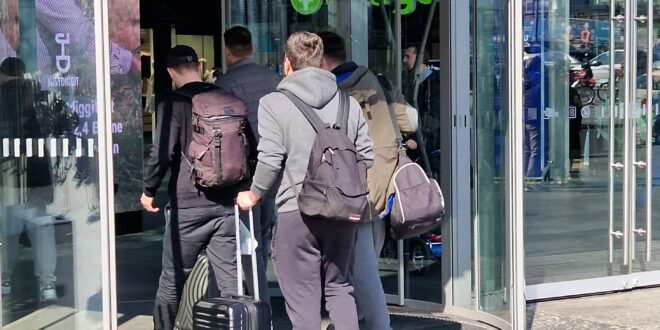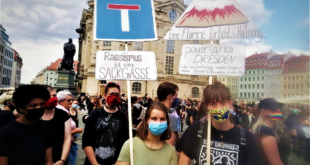No more cash for refugees, but a “credit balance” on a payment card. All federal states have now agreed that from the beginning of 2025, refugees and asylum-seekers throughout Germany are to receive their social benefits via a prepaid debit card and no longer as cash or by bank transfer.
The new card will be a “debit card” with credit that is “topped up” monthly. Personal transfers are not possible, cash withdrawals only partially. Each federal state can decide for itself which functions the new card will and will not have.
Bavaria and Mecklenburg-Western Pomerania want to introduce their own payment card systems with even more restrictions than agreed by the other federal states. For example, Bavaria is planning a payment card with which the holders will only be able to withdraw a “small amount” and only where they live.
The federal and state governments had agreed on the new card in November 2023. In the Bundestag, the CDU/CSU parliamentary group in particular had campaigned in favour of avoiding cash payments “as far as possible” and introducing a uniform nationwide payment card in the federal states. Within the governing federal coalition, the FDP is particularly in favour of the new system.
Hamburg’s “SocialCards”
Hamburg has now become the first federal state to issue such cards to asylum-seekers. The social card, as it is called in Hamburg, is a credit-based Visa card, according to the Department of the Interior and Social Affairs. It is issued by the Office for Migration.
Since Thursday, newly-arrived refugees in the initial reception centres who are entitled to benefits under the Asylum Seekers’ Benefits Act have been receiving the prepaid card, said a spokesperson for the social services department. According to the Department of the Interior, 28 of these new “SocialCards” were issued on the first day.
Each adult would receive a monthly credit of 185 euros, which could be used to buy and pay for everyday items. Benefits for children would also be credited to a parent’s card. According to the information, cash withdrawals are also possible at ATMs – but only up to a maximum amount of 50 euros per month – plus 10 euros for each child.
For now, only newly-arrived refugees in the first reception centres receive the prepaid card, but it will gradually be issued to other asylum-seekers and refugees as well.
Discouraging irregular migration with benefits in kind?
One of the aims of the card is to prevent asylum-seekers and refugees from transferring money to their family or friends in their home countries. “In my view, this is a very important step towards reducing incentives for irregular migration to Germany,” said the Hessian Minister President and Chairman of the Conference of Minister Presidents (MPK), Boris Rhein, a member of the CDU.
The Co-Chair of the Conference of Minister Presidents, Stephan Weil, a member of the SPD who is the President of Lower Saxony, explained: “The financial resources provided under the Asylum-Seekers’ Benefits Act are intended to secure a livelihood in Germany and are not intended to finance families in the home country.”
Rhein explained that each state decides for itself on the amount of cash and other additional functions and that every benefit recipient must be paid a portion of the money in cash, a sort of pocket money, between 100 to 150 euros.
In effect, the payment card for refugees is intended to discourage people from coming to Germany, a populist policy that has been criticized by migration experts and social welfare organisations.
In the opinion of the migration researcher Herbert Brücker, the introduction of the payment card will not lead to a reduction in the number of asylum applications or prevent remittances to the countries of origin.
“We know from studies that only ten to 20 per cent of asylum-seekers actually make such remittances,” explained Brücker. The sums transferred are also very small. If remittances do occur, their effect is “not negative per se”, he said. This is because the money is used to support family members who are more likely to stay in their countries as a result.
“The effects that are hoped for from a payment card for asylum-seekers are highly unlikely to materialise,” said the migration expert. There is virtually no reliable evidence that the level of benefits for asylum seekers influences the number of asylum applications, he opines.
Pro Asyl has called the payment card a “discriminatory instrument”. The main purpose is to make life difficult for people here and to deter them, the refugee support organisation said.
In the first few months after arriving in Germany, refugees receive food, clothing, hygiene products and limited essential healthcare needs directly in the initial reception centres of the federal states.
How much do asylum-seekers receive?
In the first few months of their arrival, these benefits in kind take precedence over cash, of which asylum-seekers and refugees usually only receive “pocket money” of around 150 euros per month for “personal needs”. In some federal states, such as Bavaria, they also receive public transport tickets and internet access as benefits in kind, but less “pocket money” (105 euros in the central reception centres).
When asylum-seekers later move out of the initial reception centres, they primarily receive cash benefits for their “necessary needs” instead of benefits in kind. Once they arrive in a municipality, the respective municipality itself decides how they receive state benefits. In some federal states, they have to collect their money each month from the “payment centres” of the social welfare offices. In other federal states, they receive it by bank transfer.
Some federal states focus primarily on cash benefits, others more on benefits in kind. North Rhine-Westphalia, for example, pays out around three quarters of basic benefits in cash. In Saxony, the opposite is the case as more than three quarters of basic benefits are paid out in kind.
Asylum-seekers receive 460 euros for singles and 826 euros for couples while families with children can receive up to 1,900 euros. Their benefits are around 18 per cent less than the welfare benefits that Germans, resident foreigners with regular resident permits, recognised refugees and refugees from Ukraine receive.
As soon as they are recognised as refugees, they receive the full citizen’s allowance.
Vivian Asamoah
READ ALSO More than 50,000 residence permits issued in Germany
 THE AFRICAN COURIER. Reporting Africa and its Diaspora! The African Courier is an international magazine published in Germany to report on Africa and the Diaspora African experience. The first issue of the bimonthly magazine appeared on the newsstands on 15 February 1998. The African Courier is a communication forum for European-African political, economic and cultural exchanges, and a voice for Africa in Europe.
THE AFRICAN COURIER. Reporting Africa and its Diaspora! The African Courier is an international magazine published in Germany to report on Africa and the Diaspora African experience. The first issue of the bimonthly magazine appeared on the newsstands on 15 February 1998. The African Courier is a communication forum for European-African political, economic and cultural exchanges, and a voice for Africa in Europe.


































